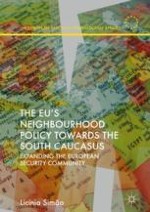2018 | OriginalPaper | Buchkapitel
4. Regional and Global Neighbours of the South Caucasus
verfasst von : Licínia Simão
Erschienen in: The EU’s Neighbourhood Policy towards the South Caucasus
Aktivieren Sie unsere intelligente Suche, um passende Fachinhalte oder Patente zu finden.
Wählen Sie Textabschnitte aus um mit Künstlicher Intelligenz passenden Patente zu finden. powered by
Markieren Sie Textabschnitte, um KI-gestützt weitere passende Inhalte zu finden. powered by
